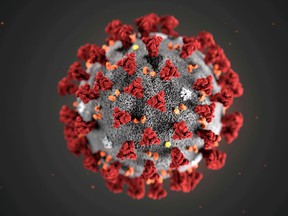Article content
Here’s your daily update with everything you need to know on the novel coronavirus situation in B.C. for Aug. 28, 2021.

Here’s your daily update with everything you need to know on the novel coronavirus situation in B.C.
Here’s your daily update with everything you need to know on the novel coronavirus situation in B.C. for Aug. 28, 2021.
We’ll provide summaries of what’s going on in B.C. right here so you can get the latest news at a glance. This page will be updated regularly throughout the day, with developments added as they happen.
Check back here for more updates throughout the day. You can also get the latest COVID-19 news delivered to your inbox weeknights at 7 p.m. by subscribing to our newsletter here.
As of the latest figures given on Aug. 27
• Total number of confirmed cases: 163,560 (5,657 active cases)
• New cases since Aug. 25: 867
• Total deaths: 1,807 (three additional deaths)
• Hospitalized cases: 159 (up 10 since Thursday)
• Intensive care: 84 (up one since Thursday)
• Total vaccinations: 3,886,952 received first dose; 3,514,485 second doses
• Recovered from acute infection: 155,928
• Long-term care and assisted-living homes, and acute care facilities currently affected: 14
IN-DEPTH:COVID-19: Here are all the B.C. cases of the novel coronavirus
• COVID-19: Here’s everything you need to know about the novel coronavirus
• COVID-19: Here’s how to get your vaccination shot in B.C.
• COVID-19: Look up your neighbourhood in our interactive map of case and vaccination rates in B.C.
• COVID-19: Afraid of needles? Here’s how to overcome your fear and get vaccinated
• COVID-19: Five things to know about the P1 variant spreading in B.C.
• COVID-19: Here are all the B.C. cases of the novel coronavirus in 2021
• COVID-19: Have you been exposed? Here are all B.C. public health alerts
• COVID-19 at B.C. schools: Here are the school district exposure alerts
• COVID-19: Avoid these hand sanitizers that are recalled in Canada
• COVID-19: Here’s where to get tested in Metro Vancouver
• B.C. COVID-19 Symptom Self-Assessment Tool
People who get the Delta variant of the coronavirus are twice as likely to be hospitalized as those who were infected by the Alpha variant which was first detected in England last year, a study showed on Friday.
The study, based on more than 43,000 COVID-19 cases of mostly unvaccinated people in England, compared the risk of hospitalization for people infected with Delta, which was first detected in India, with people who caught Alpha.
“Our analysis highlights that in the absence of vaccination, any Delta outbreaks will impose a greater burden on health care than an Alpha epidemic,” Anne Presanis, one of the study’s lead authors and a University of Cambridge statistician, said.
The study was based on cases between March and May during the early stages of Britain’s COVID-19 vaccination campaign, so it was not able to assess the extra risk of hospital admission for unvaccinated or partially vaccinated people.
The study, published in the Lancet Infectious Diseases journal, was the largest so far to analyze COVID-19 cases confirmed by virus genome sequencing.
-Reuters
Premier John Horgan has told B.C. businesses to call the police if they face abuse from unvaccinated people trying to enter their establishments without B.C.’s vaccine card.
Horgan made the remarks at a news conference at Logan Lake on Friday afternoon.
“With respect to enforcement, it’s not unlike with respect to nightclubs or in the hospitality sector. Iif they have trouble with patrons, they call law enforcement and that’s what I would expect to happen,” said the premier.
Starting Sept. 13, proof of one vaccination will be required to enter restaurants, bars, nightclubs, casinos, sporting events, gyms and theatres. As of Oct. 24, proof of two vaccinations will be needed.
Horgan made his comments as the Health Ministry announced a significant jump in the number of new COVID-19 cases, 867 news cases, up from the 724 reported on Thursday.
The premier brushed off an unconfirmed report that someone in Nanaimo is already selling fake vaccination cards.
-Lisa Cordasco
The trend for COVID-19 infections in British Columbia continues upward with 867 new cases, the highest daily total in about four months.
Three more people have died, while 159 people are in hospital and 84 of those are in intensive care.
There are 5,657 active cases in the province and nearly 39 per cent of those are in the Interior Health region, where tougher restrictions were put in place this month.
Interior Health reported the most new cases with 350, followed by Fraser Health with 228 new cases, Vancouver Coastal Health with 165 new cases and Island Health and Northern Health with 63 and 61 new cases, respectively.
-The Canadian Press
B.C. colleges will not be joining universities in requiring students, staff and visitors to disclose their vaccine status or undergo rapid testing for the COVID-19 virus because they say they are legally not allowed to do so.
A statement from B.C. colleges on Friday afternoon said provincial law prevents them from implementing the additional safety measures similar to those taken by universities.
“Colleges operate differently from universities,” the statement said, “as they are considered agents of government under the College and Institute Act, and have determined they must follow the direction of the provincial health officer.” It said it would enforce orders issued by Dr. Bonnie Henry.
On Tuesday, Henry ordered that students who live on campus must be vaccinated and all students will need to comply with province-wide health orders to wear masks at all public indoor spaces immediately, and show proof of vaccination to enter non-essential services starting Sept 13.
The president of the faculty association at Vancouver Community College, Taryn Thomson, said college instructors are disappointed by the decision to forgo additional measures.
“The government is unnecessarily causing chaos by making different rules for different people in the same sector,” said Thomson. “The students in college nursing programs are required to be vaccinated, but other students at the college are not. The vaccine card means students will have to show proof of vaccination at some services on campus, but not in classrooms. It’s incredibly confusing.”
— Lisa Cordasco and Tiffany Crawford
Find out how your neighbourhood is doing in the battle against COVID-19 with the latest number of new cases, positivity rates, and vaccination rates:
Here are a number of information and landing pages for COVID-19 from various health and government agencies.
• B.C. COVID-19 Symptom Self-Assessment Tool
• Vancouver Coastal Health – Information on Coronavirus Disease (COVID-19)
• HealthLink B.C. – Coronavirus (COVID-19) information page
• B.C. Centre for Disease Control – Novel coronavirus (COVID-19)
• Government of Canada – Coronavirus disease (COVID-19): Outbreak update
• World Health Organization – Coronavirus disease (COVID-19) outbreak
–with files from The Canadian Press

An insect-transmitted virus that can infect sloths, primates, and birds is spreading at an “unprecedented” rate, according to global health officials. Oropouche fever, a potentially fatal zoonotic disease, is now emerging in parts of the world where it has never been detected before, including Europe. The World Health Organization (WHO) has reported that the virus, transmitted by tiny flies called midges and mosquitoes, is spreading beyond its traditional stronghold in Central and South America.
Oropouche fever, which is part of the same family of diseases as Zika and dengue fever, has traditionally circulated in Central and South America. However, recent research published on August 8 in The Lancet indicates that the virus has also been detected in new locations, including Cuba, Italy, and Spain.
The research paper noted that “Arboviral infections have hit South America heavily in the past decade…. In addition, the region is now facing the re-emergence of another little-known arbovirus, Oropouche virus, on an unprecedented scale.” As of August 1, 2024, there have been 8,078 confirmed cases in Bolivia, Brazil, Colombia, and Peru, compared to just 832 cases reported in 2023. The first deaths linked to Oropouche fever were reported in late July, involving two young women in Brazil with no underlying medical conditions.
In response to the virus’s spread, both the Pan American Health Organization (PAHO) and the European Centre for Disease Prevention and Control (ECDC) have issued warnings. In June and July, Europe reported its first 19 cases of Oropouche virus disease, with Spain (12 cases), Italy (five cases), and Germany (two cases) being affected. The majority of these cases were linked to travel to Cuba, with one case connected to Brazil.
Dr. Isaac Bogoch, a Toronto-based infectious diseases specialist, expressed concern over the virus’s potential spread to Canada, especially given the rise in cases in popular travel destinations like Cuba. “There’s a giant knowledge gap,” Bogoch said, highlighting that many healthcare professionals and the general public may be unaware of the virus, which could lead to underreporting.
Oropouche fever is a zoonotic disease first identified among forest workers in Trinidad in 1955, and later in a sloth in Brazil in 1960. Since then, more than 500,000 cases have been reported in the Americas, though the true extent of the virus’s spread may be underestimated. The virus is primarily transmitted to humans through the bite of an infected midge or mosquito, with no direct human-to-human transmission documented so far.
Symptoms of Oropouche fever can resemble those of dengue fever and Zika virus, including fever, chills, nausea, vomiting, headache, joint pain, muscle pain, sensitivity to light, and pain behind the eyes. In rare cases, the virus can lead to severe complications such as aseptic meningitis, which involves inflammation of the membranes surrounding the brain.
The spread of Oropouche fever has been linked to climate change, urbanization, and deforestation. A study from 2017 examined an outbreak in Peru and found a significant connection to deforestation, which may displace the virus’s animal hosts and increase the likelihood of midges feeding on humans. Extreme weather conditions such as heavy rainfall and flooding, which create ideal breeding conditions for midges, have also been identified as contributing factors.
Currently, there is no vaccine or specific treatment for Oropouche fever. Prevention is the best defense, with the Centers for Disease Control and Prevention (CDC) recommending the use of insect repellent, window and door screens, and fans to keep midges and mosquitoes at bay. Since midges are smaller than mosquitoes, traditional mosquito nets may not be effective.
“Good insect repellent works extraordinarily well,” Bogoch advised, recommending repellents containing 30% DEET or 20% picaridin for the best protection.
The Canadian government has also issued travel precautions, advising those traveling to regions with Oropouche fever outbreaks to take extra care, particularly pregnant women, due to the potential risk of transmission from mother to fetus.
As the virus continues to spread, health officials urge travelers and healthcare providers to remain vigilant and report any symptoms that could be related to Oropouche fever. The situation highlights the growing threat of infectious diseases in a rapidly changing global climate.

Starting a fitness regimen calls for proper nutrition. Fitness calls for a healthy, well-planned diet tailored to your needs, not only exercise. The major nutrition elements that can improve your fitness potential will be covered in this all-inclusive book.
Understand your nutritional needs.
Maximizing results depends on knowing your body’s dietary requirements. Age, gender, weight, degree of exercise, and fitness goals all affect one’s needs. A balanced diet should also call for carbohydrates, proteins, fats, vitamins, and minerals. While dietitians and nutritionists can offer advice, basic concepts can get you going.
Do you need supplements?
Although they can be a great addition to a good diet, supplements shouldn’t be taken as replacements. Nutritional deficits can be filled in part with multivitamins, protein powders, omega-3 fatty acids, and vitamin D pills. Before adding any premium vitamins to your regimen, though, you should see a medical practitioner. This stage guarantees that you are making wise judgments catered to your requirements and health condition, giving you confidence in your choices.
Some exercise supplements are supposed to improve performance and recovery. Products for muscular development and endurance exist from numerous reputable sources, like flexpharma.is. Researching and choosing supplements that meet your goals and degree of fitness is essential to make sure they will offer the expected results.
Macronutrients’ role
Macronutrients and diet components help in many ways in supporting fitness goals. Your regular workouts and activities depend on carbohydrates for energy. For nutrients and energy, choose complex carbohydrates including fruits, vegetables, and whole grains.
Proteins are needed for muscle development and repair Among the lean proteins that help muscle development and recovery are chicken, fish, tofu, and lentils. Moreover, proteins satisfy you, reducing the need for continuous unhealthy dietary intake.
Though perspectives vary, fats are vital for controlling hormones and general health. Moderately ingested good fats can have benefits. Avocado, almonds, seeds, and olive oil give long-lasting energy and support cellular activity vital for fitness.
Hydration and micronutrients
Although macronutrients are vital, vitamins and minerals are just as critical. These components support immune response, bone health, and energy generation. To satisfy your micronutrient requirements, load many vibrantly coloured fruits and vegetables.
Nutritional support calls for hydration as well. Every cellular function—body warmth, joint lubrication, nutrient transfer—depends on water. Eight glasses of water a day—more if you exercise vigorously. Liquids high in electrolytes can help with mineral replacement following demanding workouts.
Sustainable eating plan
One diet you can stick to without feeling hungry or anxious is sustainable. Set realistic diet goals and gradually change. Reduce sugary processed foods and increase nutrient-dense foods. Food preparation and planning will help you eat well all week.
Listen to your body, too. Consider how diet affects energy and performance. Everyone reacts differently, so what works for one may not work for another. A diet should reflect your growth and experiences.
Conclusion
Fitness requires nutrition. Know your nutritional needs, balance macronutrients, get appropriate micronutrients, and keep hydrated to perform well. A good diet and the utilization of supplements will determine your success. Consistency and diet are key to fitness. Start now and let diet affect your workouts.


Alberta NDP Leader Naheed Nenshi slams premier’s plan to transfer hospitals


Vote on $47.8B First Nations child welfare deal delayed due to chiefs’ concerns


LinkedIn Isn’t the Place to Express Your Frustrations and Anger


US Open: Naomi Osaka gets her first top-10 win in more than four years by defeating Ostapenko


Duran leads off with 20th homer, Red Sox beat Blue Jays 6-3 to stop skid


CanadaNewsMedia news August 28, 2024: Sentencing for convicted killer, and military sex assault verdict


Diallo salvages a rough opening day for Canadians at U.S. Open
Violent crimes surge in York Region, police call increase troubling